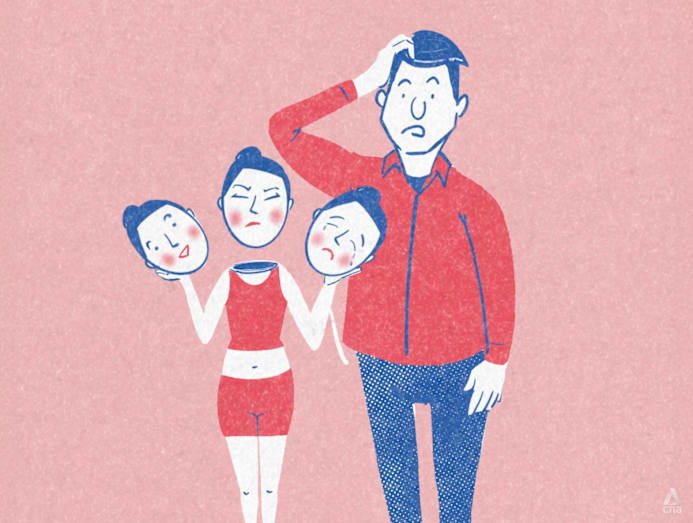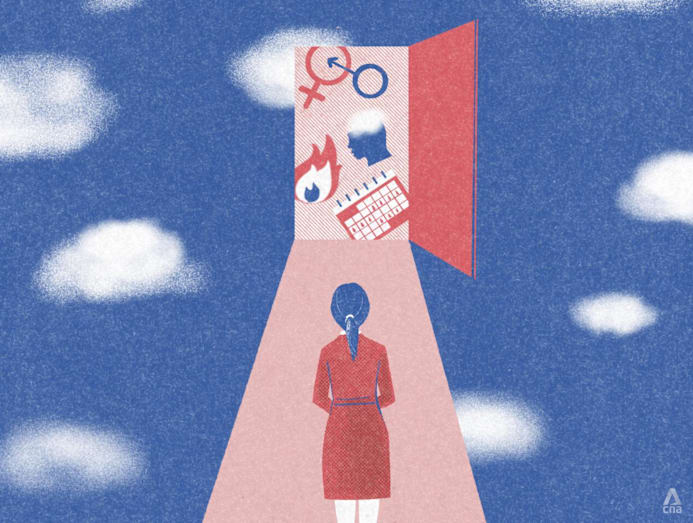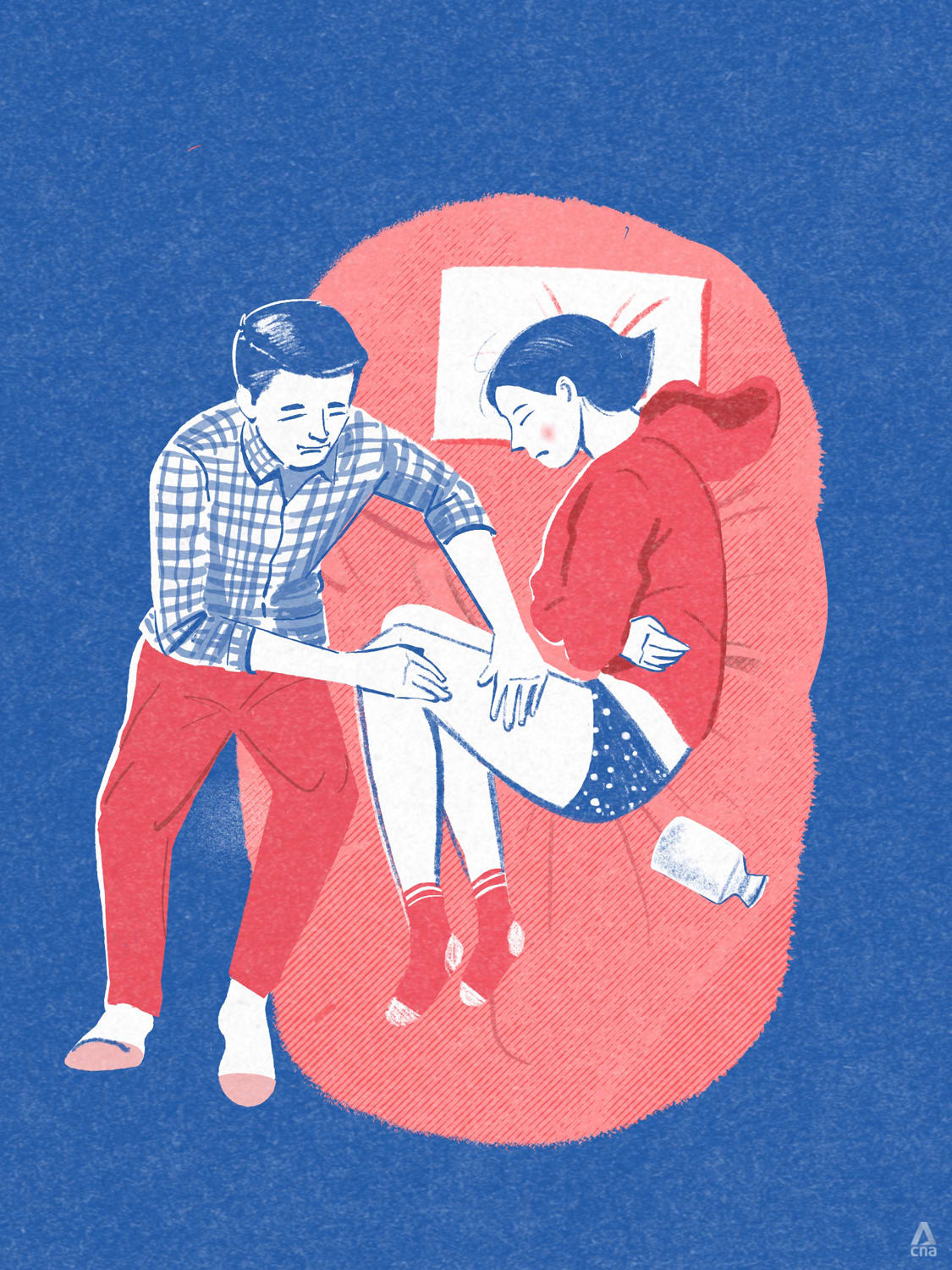'Sometimes, all it takes is a hug': What women want their partners to know about menopause and how to help
If you’re going through menopause, hot flushes, brain fog and mood shifts can be overwhelming – and even harder when your partner doesn’t understand what’s happening. Here’s how to navigate this transition together.

Being heard and validated matters more to a woman going through menopause than her partner trying to ‘fix’ her feelings and symptoms. (Art: CNA/Jasper Loh)

This audio is generated by an AI tool.
Jolynn (not her real name) has been struggling with perimenopause symptoms since the beginning of this year. This stressful time has affected her relationship with her partner.
“He doesn’t seem to understand that sometimes, it’s a struggle – the mood swings and randomly feeling hot,” said the 45-year-old financial consultant. “We even argue about me turning the air conditioning down."
She added that her partner not understanding menopause could be because he had very little exposure to it as his mother died when he was 12. The couple argue more often now and Jolynn feels like her menopause symptoms “doesn’t seem like a big deal to him”.

Menopause can be a confusing period and not being on the same page as your partner isn’t unusual.
Dr Annabelle Chow, principal clinical psychologist at Annabelle Psychology, explained that the general lack of awareness and education around perimenopause and menopause can leave some women feeling alone.
Trying to explain what they’re going through, especially while they’re still trying to make sense of it for themselves, can feel exhausting, Dr Chow said.
“If their partner doesn’t respond in a way that feels supportive or validating, it can lead to frustration or even pulling away from the relationship,” she added.
Women may find it difficult to have open conversations about menopause given that these are relatively private or even embarrassing topics. They might feel unsure about how much to share, while their partners may not know what to ask or how to respond.

Plus, the physical and emotional changes women experience during menopause can heighten sensitivity, leading to self-doubt and a drop in confidence.
“If their partners respond with a dismissive comment or fail to take things seriously, women may become more reluctant to open up,” Dr Chow told CNA Women. “As a result, they may hold back from expressing how they truly feel, worrying that they’ll be viewed as overly emotional or dramatic.”
MENOPAUSE IS LARGELY INVISIBLE
Dr Leonora Chiam, a consultant from the Department of Psychological Medicine at KK Women’s and Children’s Hospital (KKH), said many partners may not be fully aware of what menopause entails or understand that the experience of menopause can be different for each woman.
The psychiatrist said: “For example, the relationship between menopause and cognitive brain fog or physical joint pain may not be apparent. This lack of awareness can make it difficult for partners to provide validation and the required support.”
Valery Tan, co-founder of local menopause platform Surety, agreed that one of the biggest challenges women face is that “menopause is largely invisible”.
“Unlike a broken bone or pregnancy, there are no obvious signs that someone is going through menopause, which makes it easy for others, including partners, to overlook or dismiss what’s happening,” she said.
“Many women are told things like, ‘But you don’t look sick’, when in fact, they may be struggling with fatigue, brain fog or mood swings that impact their daily life significantly,” Tan added.
Unlike a broken bone or pregnancy, there are no obvious signs that someone is going through menopause.
There’s also the cultural factor, where menopause is rarely discussed openly in Asian households. Many women don’t feel comfortable even bringing it up with their partners, and partners may have little to no idea what’s going on, said Tan. Therefore, it becomes “a lonely journey”.
KKH’s Dr Chiam noted that, unlike the more socially-supported experiences of pregnancy and parenthood, there are limited systems available to help men navigate the challenges associated with their partner’s menopause journey.
They may even experience heightened stress levels and become more susceptible to developing mental health disorders such as anxiety and depression.
However, menopause could also bring couples closer. Going through life transitions together can strengthen the relationship through shared understanding and empathy, said Dr Chiam, who provides mental health care at the KK Menopause Centre, as part of KKH’s Women’s Mental Wellness Service.

“Menopause may serve as a catalyst for the adoption of more proactive health behaviours and lifestyle modifications, as individuals become increasingly attentive to both physical and mental well-being,” Dr Chiam said.
MEN, DON’T TRY TO "FIX" ANYTHING – DO THIS INSTEAD
Natalia A, 48, experienced menopause symptoms such as moodiness, tiredness, hot flushes and night sweats. Her husband could tell something was wrong, but she “couldn’t always put it into words”.
Once she started talking openly with him about her symptoms, it helped him understand that the changes in her weren’t something she could control, nor was it about him. Since being more informed about the topic, he has been thoughtful and accommodating.
“For example, we don’t usually sleep with the aircon on, but when I started getting hot flushes and night sweats, he switched it on to make sure I was more comfortable at night,” said Natalia. “It’s little things like that – being observant, adjusting without being asked – that made me feel supported.”

Dr Chow said men can support their partners by acknowledging their struggles and affirming their worth, especially when physical and emotional changes may feel overwhelming. Symptoms like weight gain, fatigue, thinning hair and skin changes can chip away at a woman’s self-image and self-confidence.
“A partner’s reassurance can make all the difference, especially when it’s genuine and comes without trying to ‘fix’ anything,” said Dr Chow. “Try saying things like, ‘I know this has been really tough on you lately’, or ‘I see how resilient you’ve been’.”
It’s also important for men not to take mood swings and emotional shifts as personal attacks. So, instead of reacting defensively, it can help to adopt a curious and compassionate stance.
Dr Chow suggested asking: ‘How can I support you right now?’ or ‘Want to talk about what you’re feeling, or would some quiet time help?’ These invite deeper sharing and convey the message that she is not alone in her struggles.
Related:
TACKLING MENOPAUSE AS A COUPLE
Associate Professor Rukshini Puvanendran, co-director of KK Menopause Centre, recommended that women share their specific symptoms with their partners and find solutions together. For example, if you have sleep issues, partners can help by avoiding bright lights and unnecessary noise.
“One of my patients’ sleep was regularly disrupted by her partner watching TV in bed – even though he used headphones, the screen’s light was enough to disturb her rest,” she said.
Partners can also be understanding about temperature differences and support different temperature needs.
“One very understanding husband shared how he would dress for winter when going to bed, as his wife, who was experiencing night sweats, needed to set the air conditioning very low,” said Assoc Prof Rukshini, who is also the head of KKH’s Family Medicine Service.

The key is for partners to just be there and offer support.
“Sometimes, women just need a listening ear but not necessarily specific advice,” said Dr Chiam. “Partners should also avoid making overly positive statements as these may seem dismissive and trivialise the significant physical and emotional impacts that menopause can have on women’s health and well-being.”
She cited some examples: ‘You’re making too big a deal out of this – it’s just part of ageing’ or ‘At least you don’t have to deal with periods anymore’.
It’s also crucial to communicate. Surety’s Tan said a small, simple question like, “How are you feeling today?” can go a long way.
Instead of assuming what she needs or trying to fix things, just asking that question opens the door for support, connection and care. The answer might change day to day and that’s okay, she added.
“Also, walk beside her, not ahead of her. This is a journey that evolves – there’s no need to have all the answers,” said Tan. “But being there, consistently and with empathy, can transform this stage of life into a deeper chapter of partnership and growth.”
Jolynn hopes men will listen to their partners and try to make them feel better with small, simple gestures.
“Sometimes, all it takes is a hug,” she said.
CNA Women is a section on CNA Lifestyle that seeks to inform, empower and inspire the modern woman. If you have women-related news, issues and ideas to share with us, email CNAWomen [at] mediacorp.com.sg (CNAWomen[at]mediacorp[dot]com[dot]sg).











